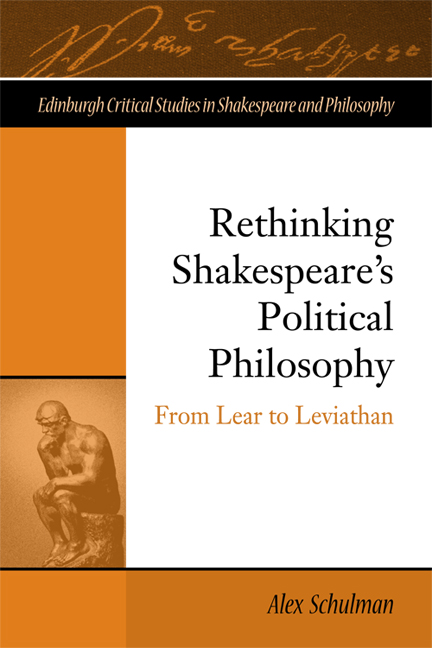Book contents
- Frontmatter
- Contents
- Acknowledgements
- Abbreviations
- Series Editor's Preface
- Introduction
- I SHAKESPEAREAN ANTIQUITY
- II SHAKESPEAREAN MODERNITY
- 3 King Lear and the State of Nature
- 4 Shakespeare's Novus Ordo Seclorum: Freedom and Authority in the English Histories
- 5 Shakespeare and the Theological'Political Problem
- Epilogue: Brave New Worlds
- Notes
- Index
4 - Shakespeare's Novus Ordo Seclorum: Freedom and Authority in the English Histories
from II - SHAKESPEAREAN MODERNITY
Published online by Cambridge University Press: 05 August 2016
- Frontmatter
- Contents
- Acknowledgements
- Abbreviations
- Series Editor's Preface
- Introduction
- I SHAKESPEAREAN ANTIQUITY
- II SHAKESPEAREAN MODERNITY
- 3 King Lear and the State of Nature
- 4 Shakespeare's Novus Ordo Seclorum: Freedom and Authority in the English Histories
- 5 Shakespeare and the Theological'Political Problem
- Epilogue: Brave New Worlds
- Notes
- Index
Summary
Thus the limitation of sovereignty is real, and it is also possible. It will be ensured firstly by the same force which legitimates all acknowledged truths: by public opinion. Subsequently it will be guaranteed more precisely by the distribution and balance of powers.
Benjamin Constant, Principes de politique(1815)Me rather had my heart might feel your love / Than my unpleased eye see your courtesy.
Marlowe's Edward II(c.1592) features a ‘pliant king’ drawn ‘which way I please’ by a male lover planning to fill the court with ‘wanton poets, pleasant wits’, ‘Italian masques’, pages dressed ‘like sylvan nymphs’ (I.50 ff.); such reorganisation rankles the existing warrior nobility, who ‘leave the brainsick king’ to ‘henceforth parley with our naked swords’ (I.124–5). Edward's lover, Gaveston, tells the ‘Base leaden earls, that glory in your birth’ to ‘Go sit at home and eat your tenants beef” (VI.74–5). But he misinterprets the situation: if they were mere hedonists they would not be such obstacles. ‘Glory’ is the sticking point. Honor ‘glories in scorning life’, Montesquieu writes, ‘and the despot is strong only because he can take life away’. The honour ethos of Warwick and Lancaster ‘scorn[s] thy threats and menaces’ as ‘but temporal’: ‘The worst is death, and better to die to live / Than live in infamy under such a king’ (XIII.21–4). In one of the great influence-ratchets in literary history, it seems, Marlowe was goaded into Edward IIby the success of Shakespeare's Henry VIseries; Marlowe's play, in turn, prompted Richard II. (Like that hapless monarch, Edward ends up murdered in prison, calling usurpation ‘my tragedy’ (XXV.74).)
Now I must plead an exception to my general framework, which moves chronologically through European history rather than Shakespeare's career. The fact that the Henriadwas composed after the Henry VIseries is, here, more important than the fact that its events take place earlier; the Henriadshall be read as the fuller depiction of political modernisation.
- Type
- Chapter
- Information
- Rethinking Shakespeare's Political PhilosophyFrom Lear to Leviathan, pp. 125 - 155Publisher: Edinburgh University PressPrint publication year: 2014



